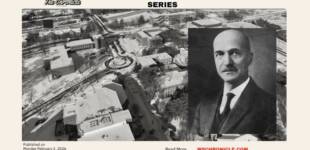Buses must get them to the place where dreams are built

By John Railey
Students living on the Wake Forest, Salem and Winston-Salem State University campuses easily walk to their classes. Forsyth Technical Community College students don’t have that luxury. Some drive in, or have loved ones drive them in. Others rely on Winston-Salem Transit Authority (WSTA) buses.
“You spend a lot of time waiting for the bus,” said Samuel Cruz, 19, who is studying toward an associate degree in science and wants to go on to a four-year college. With transfers and waiting, his trip home, which takes about 13 minutes in a car, can take over an hour in a bus.
It’s a costly inconvenience, ongoing research by Winston-Salem State University’s Center for the Study of Economic Mobility (CSEM), in cooperation with Forsyth Tech, has established through surveys. Amy Braswell, Belinda Brewster-Clémence, and Mike Massoglia of Forsyth Tech helped in creating the survey design, implementing the survey questions, and coding the data for CSEM analysis.
CSEM and Forsyth Tech have started another round of research to further define the issue. “Our goal at Forsyth Tech is to ensure every student has the opportunity to reach their full potential and life goals,” said Stacy Waters-Bailey, Forsyth Tech’s executive director of student support services. “However, we are aware that transportation is often a barrier to reaching those goals. It is our hope that we learn from the data we are collecting and identify opportunities for real change. Change that will not only help support our current students, but also the students who have yet to put their dreams into action because of a lack of transportation.”
CSEM Research Manager Zach Blizard said of the new round of research: “I would say one of the biggest objectives is to try and establish how distance traveled to class affects the performance in those classes. Do students who travel long distances perform worse (in terms of grades), complete less (in terms of credits they sign up for), etc.?”
The initial surveys revealed that, among other factors, current students are not taking classes they could otherwise take, and potential students aren’t enrolling. That means from $405,156 to $633,688 in foregone tuition revenue from current students, and from $671,232 to $1,039,680 in foregone tuition revenue from prospective students. Other findings include about 57% of responding students stating they would do more school-related activities, such as homework, studying, or attending a study group, with time saved from quicker commutes.
CSEM Director Craig Richardson calls such factors a “time tax” that inhibits upward economic mobility for individuals and adversely affects the local economy as a whole.
Forsyth Tech is an engine for the local economy, helping residents achieve their dreams. Easing the college’s transportation to school is crucial. Forsyth Tech, a leader in local economic mobility efforts, realizes that and has a task force that, working from the research, is reviewing options to ease the transportation issue, including a campus bus loop and working with WSTA on more direct routes to its campuses.
The college is adversely impacted by urban sprawl and the transportation costs that come with it, just like so many other institutions and individuals here and nationwide.
“Students tell us that in some cases, they miss classes offered for their major, take fewer credits, and have less access to professors than desired due to transportation challenges,” Blizard and Richardson write in their commissioned report: A Study of Forsyth Technical Community College Students: How Do Transportation Challenges Impact Their Educational Experience?
The research is paid for by The Winston-Salem Foundation, which set up a round of grants to innovative transportation initiatives. The foundation enacted its program in large part because of CSEM’s earlier research into local transportation challenges. Forsyth Tech secured one of the foundation grants and enlisted CSEM to do the research.
Cruz and another bus-riding student, Letroya McCray, welcome the research. “If it could make the bus system better, that would be great,” said McCray, who is 24 and is studying graphic arts and imaging. Riding the bus to Forsyth Tech takes her 30 to 45 minutes. When she catches a ride in a car, it takes 15 to 20 minutes, she said. “Taking the bus most definitely takes up a lot of time.”
John Railey, raileyjb@gmail.com, is the writer in residence for CSEM, www.wssu.edu/csem.









